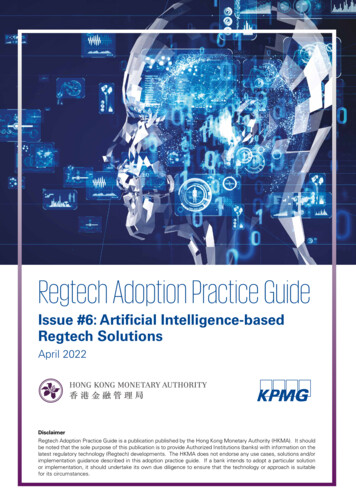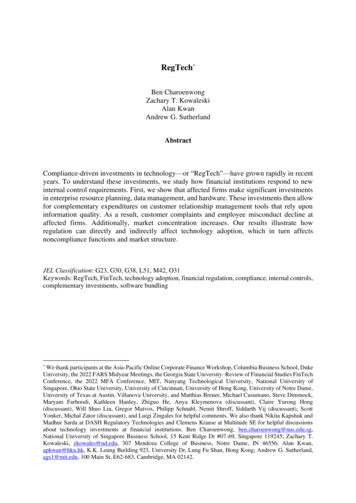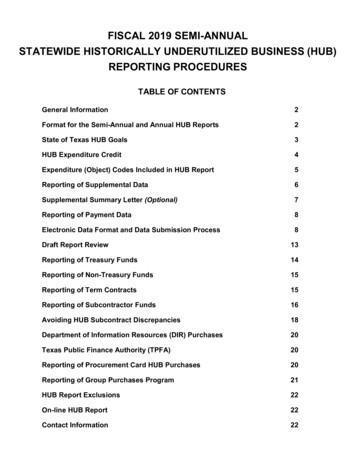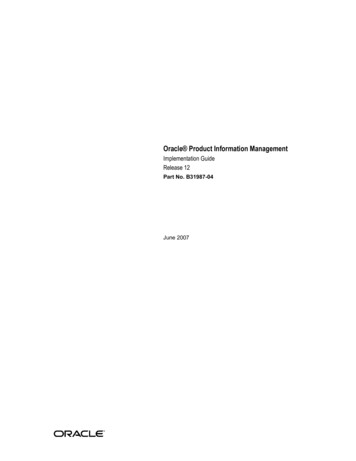
Transcription
Australia’s global RegTechhub poised for growthA perspective on supporting thelocal RegTech sector to scaleX
Boston Consulting GroupBoston Consulting Group partners with leaders in business and societyto tackle their most important challenges and capture their greatestopportunities. BCG’s diverse, global teams bring deep industry andfunctional expertise and a range of perspectives to spark change throughleading-edge management consulting as well as data science, technologyand design, digital ventures, and business purpose. We work in a uniquelycollaborative model across the firm and throughout all levels of the clientorganisation to deliver results that help our clients thrive.BCG Expand FinTech Control TowerBCG Expand FinTech Control Tower (FCT) is a research focused unitdeveloped jointly by the Boston Consulting Group (BCG) and ExpandResearch. The FCT identifies initiatives, technologies, and companiesthat matter most in today’s FinTech ecosystem and assess their impact.This is completed using our internal platform that can ingest data frommultiple sources and apply a proprietary taxonomy combined with arigorous framework, resulting in a highly accurate and globally completeFinTech dataset. We engage directly with financial institutions, regulators,industry stakeholders and innovators, putting us at the forefront of thelatest research and FinTech trends.The RegTech AssociationThe RegTech Association was founded in 2017 in Australia as anon-profit organisation that focuses on what is needed to supportthe growth of the global sector and to accelerate RegTech adoptionacross all regulated industry verticals. Our vision is to be a global centreof excellence by facilitating the building of higher performing, ethicaland compliant businesses through RegTech innovation and investment.2
About this reportThis report has been developed in partnership withBCG Expand FinTech Control Tower, a subsidiary of theBoston Consulting Group, and The RegTech Association.It draws on findings from BCG Expand’s FinTech ControlTower global report into the RegTech landscape, whichhas considered:A taxonomy of RegTech segments.Global growth trends in RegTech and relatedequity funding.RegTechs’ responses to COVID-19 and how theycontinue to adapt to support regulators, businessesand consumers.The Australian edition of this report, Australia’s globalRegTech hub poised for growth, applies a local lens to theRegTech sector. It is informed by interviews with localRegTech executives, a survey of The RegTech Associationmembers, and perspectives from The RegTech Association,the peak industry body headquartered in Australia.3
SummaryAustralia’s RegTech sector is the third largestin the world behind the US and the UK.There are opportunities for both the public andprivate sectors to support Australia’s RegTechsby jointly driving demand for RegTechsolutions, creating new funding pools,enhancing regulatory frameworks to supportinnovation, and promoting RegTech to buildthe industry’s profile and talent pipeline.However, this strong position is under threatas investment in local RegTech has declinedby 50% since 2018 while RegTech investmentaround the world has hit record levels. Today,only 1% of the global investment in RegTechis in Australian companies.This support would help local RegTechs toscale, creating jobs, supporting the exportof Australian solutions into overseas markets,and improving the efficiency and effectivenessof regulatory compliance and oversight tobenefit consumers, companies and regulators.RegTech, short for Regulatory Technology,is the application of emerging technologyto improve the way businesses manageregulatory compliance.Source: BCG FinTech Control Tower
The RegTech landscapeRegTechs gained early momentum servicing financialinstitutions, and initially supported compliancefunctions on a narrow range of problems. Today, thesector is expanding to other regulated industries such asthe public sector, telco and energy, with solutions coveringa wide range of needs not just in compliance but also insupporting in digital transformation. In fact, over 80% ofAustralian investment in RegTechs has a cross-sectorfocus, reflecting the universality of the challengesRegTechs are seeking to address. This diversification hassolidified the relevance and importance of RegTechs, butat the same time made it harder for outsiders to navigatethe landscape.In financial services and other industries, Australianorganisations face a sizeable regulatory and complianceburden from the breadth of laws and regulations theymust comply with, the pace with which new regulationsare being developed, and an increased focus onenforcement. Organisations struggle to manage thiscomplexity with manual oversight or bespoketechnology builds. In this context, Australian RegTechsfirms have evolved to offer technologically advancedsolutions from analysing regulatory requirements, tomonitoring compliance, to meeting ever-expandingreporting needs. At scale, RegTechs have the potential tofundamentally transform the efficiency and effectivenessof compliance and oversight for the benefit of customers,companies and regulators.RegTech solutions underpin many day-to-day interactionsthat make doing business simpler and safer, withoutbeing apparent to most consumers. For example,creating secure portals to safely share information witha bank or telco. Improving the speed and accuracy withwhich fraud is detected. Using artificial intelligence tobetter train customer service representatives. Ensuringfinancial advice meets required standards. These needs,plus hundreds more, are being radically improved throughthe work of RegTechs.The RegTech Association and BCG FinTech ControlTower, with input from RegTech companies andAssociations in Australia and around the world, areseeking to create a standard RegTech taxonomy(Exhibit 1). This taxonomy is intended to facilitateunderstanding of the sector and make it easier forRegTechs to engage with different stakeholders –investors, customers, policy makers and regulators.Exhibit 1 The RegTech taxonomyRegTechTaxonomyTAw rainar inen g aes ndsSolutions that identify or modelimpact on risk thresholds inreal-time for the purposes ofmeeting regulatory requirementsof liquidity and capital bufferskRis alysisAn7 Clusters16 Sub-CategoriesReTecmotehniquesReportingentemnag ionMa ormatfInDatacesntioTranurmatoAuRM ecoran iancegementTrack, identify and interpretregulations. Includes solutionsthat identify compliance gapsdue to changing regulatoryobligationsPoMa licynagementRAnegulaaly torsis yyMonitoringSolutions that validate regulatoryreports pre-submission, ensure dataaccuracy, streamline the processof consolidating the data into therequired standard format, or otherworkflow automation in thereporting processvacRRe egpo ularti torng yOrganise and manage sensitivedigital assets, including personalidentifiable information, toenable organisations meetprivacy regulationsPrittaenDandRisk aolnContrmeple & nceIm tion rnata oveGss- riseCro terp nsEn lutioSosscero tionr P sahe miOt ptiOGovernance, Risk and Compliancesolutions and other processoptimisation tools such as documentmanagement, case managementand automated notificationsEnhancing the process of gatheringand verifying information includingidentity, in due diligence, Know YourCustomer (KYC) and Anti-MoneyLaundering (AML)Monitoring transactions for AML,market abuse or surveillance ofemployee behaviour for suspiciousactivitiesRegTech defined as technology solutions that facilitate effective regulation or regulatory compliance as a primary value propositionSource: BCG FinTech Control Tower5
Australia: An emergingglobal RegTech hubThe 2008 financial crisis led to a stronger focuson risk management and regulatory compliance infinancial markets around the world, which in turninitiated a period of strong growth for RegTechs. InAustralia, growth was more gradual until a push fromregulators and policy makers in 2016, closely followedby the Royal Commission into Misconduct in theBanking, Superannuation and Financial ServicesIndustry from 2017 to 2019 that gave it new momentum.In addition, Australia’s position was supported bythe establishment of The RegTech Association as anindependent, non-profit body to educate and mobilisepolicy makers, regulators, regulated entities andRegTech companies. This has created a foundationfor collaboration and created momentum to supportand deploy solutions.Exhibit 2 Australia has emerged as a RegTech hub with 80 firms headquartered in the countryThere are 600RegTechs globally 598 and 80 are based in Australia, making it one of the largest RegTech hubs inthe world174122(20%)3rd109272(45%)highest number of RegTechsbased in Australia, accountingfor 13% of global total80204(34%)No. of 21Singapore201616Ireland SwitzerlandAPAC16Israel14Luxembourg GermanyEMEA1. RegTechs categorised by HQ location 2. Cumulative total as of end 2020 H1Source: BCG FinTech Control TowerToday, Australia is the world’s third largest RegTech hub,behind the US and the UK (Exhibit 2). Since 2015, growthin Australia (15% CAGR) has significantly outpaced globalgrowth (6% CAGR). This is despite a relative lack ofinvestment funding locally, with Australian RegTechs16The RegTech Association (2019) RegTech Industry Report: The Founders Perspective, Australia1414attracting only 1% of global investment in thesector (Exhibit 3). Around 70% of local RegTechsare bootstrapped, with no equity raised fromtraditional sources or bank debt1.AMERICAS
Exhibit 3 Australian RegTechs have attracted only 1% of equity fundingRegTechs have raised USD 6B globally 0.15(3%) of which only 1% has gone to Australian RegTechs3,0911.98(33%)73.87(65%)1,045755289Equity Funding( B)rank in terms of equityfunding into AustralianRegTechs; funding levelssignificantly lower thanthe top 5 reland8080Cyprus7672664848Australia Switzerland NetherlandsAPACEMEAGermanyAMERICAS1. RegTechs categorised by HQ location 2. Cumulative total as of end 2020 H1Source: BCG FinTech Control Tower7
Investment lags innovationFunding for RegTechs has reached record highs around the world in the pastfive years, driven by a sharp increase in US 100 million ‘mega rounds’, thatindicate a maturing market for RegTech capital investment.Australia, however, has gone against the trend. Australia’s fall in RegTechfunding (Exhibit 4) is in line with Australian investment in innovation overall.In 2020, Australia was ranked #23 on the Global Innovation Index, downfrom #20 in 20182. As a result, growth and innovation in Australia’s RegTechindustry has outstripped funding. The local market is small, typically riskaverse, and often lacks an understanding of RegTech solutions. Low levelsof local funding opportunities risk leaving Australia’s RegTech companiesat a disadvantage.Case study: Global RegTech fundingmega roundsThe last two years have seen examples of RegTech playersbeing funded through ‘mega-rounds’, where total fundingexceeds US 100 million. These funding rounds often attractmultiple types of investors, including venture capital, privateequity funds and banks. Examples of these funding roundsare highlighted below.Verafin, a Canadian RegTech established in 2003 focusing onfinancial crime management, received US 388 million inSeptember 2019 from Scotiabank, Spectrum Equity, NorthleafCapital Partners and Information Venture Partners.OneTrust, a US based RegTech specialising in data compliancemanagement, received US 410 million across two fundingrounds in 2019 and 2020, from Coatue Management andInsight Partners.BioCatch, an Israeli RegTech that provides behaviouralbiometrics solutions, received US 145 million in April 2020from several firms including American Express, Bain Capital,CreditEase and OurCrowd.2Cornell University, INSEAD, and WIPO (2020) The Global Innovation Index 2020: Who Will Finance Innovation?, Ithaca,Fontainebleau, and Geneva. Cornell University, INSEAD, and WIPO (2018) The Global Innovation Index 2018: Energizingthe World with Innovation, Ithaca, Fontainebleau, and Geneva.8
Exhibit 4 Since 2008, global RegTech equity funding has drasticallyoutpaced funding for Australian firmsEquity funding by year for RegTechsglobally (USD M)Equity funding by year forAustralian RegTechs (USD M)Note: Different scale to global funding chart .72008 2009 2010 2011 2012 2013 2014 2015 2016 2017 2018 2019Data ComplianceManagementMonitoring3.92.60.1 0.1 0.1 0.1 0.1 1.62008 2009 2010 2011 2012 2013 2014 2015 2016 2017 2018 20191.5ReportingVerificationBetween 2018 and 2019, RegTechs globallyexperienced an 80% growth in annual fundingImplementation& GovernanceRegulatoryAnalysisRiskAnalysisIn the same period, Australian RegTechsexperienced a 50% decline in fundingSource: BCG FinTech Control TowerRegTech founders are typically industry practitionersexperienced in compliance and regulation, confidentthat technology can provide a better way to do things.The RegTech Association research indicates that 71% ofmember organisations consider themselves beyond ‘earlystage’ organisations, extending into the small-mediumenterprise stage. Despite this, the funding mix inAustralia skews towards early stage seed and angelinvestments. This contrasts with trends globally, wherethe funding mix is more balanced across early stagefunding and subsequent series A to D (Exhibit 5).Interviews with RegTech founders suggest that onechallenge to local funding is the lengthy sales cycle; itcan often take up to two years to sell a software-as-aservice solution into a major Australian corporate. These3timelines can put off second round investors who typicallylook at revenues as driver of their investment decision.Australian RegTechs say that reduced access tosubsequent equity funding rounds can constrainproduct innovation and their ability to scale. Someturn to opportunities in international markets wherethey can attract foreign capital and, perversely, increasetheir attractiveness to Australian customers becausemany local companies place greater trust in solutionsthat have been tested in other markets, despiteAustralia’s reputation as a global RegTech hub. AustralianRegTechs hope that the consumer trend towards ‘buyinglocal’3 amplified by COVID-19 will extend to theirsoftware-as-a-service solutions.Boston Consulting Group (2020), Australian Consumer Sentiment Snapshot series.9
Exhibit 5 Equity funding in Australia remains primarily early stage compared to amore balanced mix in other marketsType of Regtech equity funding, AustraliaType of Regtech equity funding, 0152016Seed/Angel2017Series A1. Data period from 2000 to 2020YTDSource: BCG FinTech Control Tower1020182019Series B2020H12015Series C2016Series D2017Series E 2020H1Unattributed VC
Navigating COVID-19Like most businesses, local RegTechs have experienced disruption during the COVID-19 pandemic (Exhibit 6). Almosthalf have moved to a hybrid working environment and 25% have reduced headcount. However, the biggest challengehas been an immediate reduction in revenue, driven by:A slowing of export opportunities for almost a third ofthe companies surveyed, as a result of travel restrictionsand the postponement of trade events.The disruption to regular business operations andprocurement processes of existing and potentialRegTech clients.Exhibit 6 Almost half of Australian RegTechs have seen a short-term impact onrevenue as a result of COVID-19, but limited impact on operations and fund raisingBusinessOperationCOVID-19’simpact onAustraliaRegTechsFundRaisingRevenueHighly Negative7%Negative20%No Impact53%Positive13%Highly Positive7%Highly Negative7%Negative13%No Impact60%Positive7%Highly Positive13%Highly Negative20%Negative47%No Impact7%Positive13%Highly Positive13%45%adopted hybrid work environment;14% to permanently work fromhome25%have reduced headcount,45% will maintain and 14%are increasing16%RegTechs are reporting aretraction of potential capital50%receiving Job Keeper;40% received nothing at all30%have export opportunitiesslowed; 7% have exportopportunities ceased1. Responses from two surveys of RegTech Association members conducted by the RegTech Association (RegTech Industry Pandemic Impacts, July 2020)and BCG FinTech Control Tower, 2020Source: The RegTech Association; BCG FinTech Control TowerNonetheless, Australian RegTechs remain positive aboutfuture growth and continue to seek growth capital tofund product development, talent acquisition andmarket expansion.On balance, COVID-19 should support the continuedgrowth in RegTech. The pandemic has accelerated a shifttowards remote working and digital interactions, which inturn increases cybersecurity, fraud and financial crimerisks. There is a growing focus within Federal and StateGovernments on RegTech in terms of its potential toefficiently and effectively solve regulatory and compliancechallenges, and to be a signature export for Australia.This, combined with regulatory pressure for all regulatedentities across a range of industries to adopt Reg Tech,will create a strong platform for RegTechs to excel.11
Closing the funding gapHelping local RegTechs scale is critical to ensuring they have access to athriving global RegTech market; global spending on RegTech products andservices is estimated to increase to US 127 billion in 20244. This reportproposes four pillars to the solution to help close the funding gap for localRegTechs (Exhibit 7).Exhibit 7 Both public and private entities have a roleto play to support funding and promote the growth ofRegTechs within and beyond Australia1. Drive demandfor RegTechservices2. Facilitate accessto funding3. Game changing4. Promote RegTechmoves by regulators to build profile andtalent pipelineand policy makers Help financial andother institutionsto understand thebenefits of RegTechsthrough:Coordinatingindustry wide forumsand benchmarks.Creatingmarketplaces forparticipants toengage in problemsolving together.Support certificationto maintainstandards.Create specialisedpatient capitalfunding pools fromPrivate Equity orSuperannuationfunds to invest inRegTechs.Divert aproportion ofpenalties andfines intofunding RegTechs.Establish grantprograms forimmediate accessto funds.Develop an industry- wide roadmap thatarticulates aspirationsfor RegTech.Enhance regulatoryand policy frameworkto encourageinnovation.Take a supportiveregulatory stance asfirms test and learnwhile partneringwith RegTechs.Develop and promoteinteractive programsto solve regulatorychallenges withleading edgetechnology.Form partnershipswith universitiesand start-ups to buildinterest in theindustry as acareer choice.Become clientsof RegTechs.1. Based on feedback collected through primary research with RegTech Association membersSource: BCG FinTech Control Tower412Juniper Research (2019), Opportunities for AI in RegTech, UK.
1Drive demand for RegTech servicesGovernment and regulatory bodies can act as stewards for the industry by:Increasing understanding of RegTech solutions andtheir benefits. Industry forums can educate potentialusers about types of RegTechs and what they offer.Industry-wide benchmarking of risk and compliancespend can make RegTech’s contribution to efficiencyand effectiveness of risk and compliance activities visible.Bringing market participants together to collaborate onproblem solving.Influencing purchasing decisions, such as through RegTechcertification programs that help to maintain and endorsehigh levels of professionalism in the industry.Becoming clients, since many RegTech solutionsare relevant for regulators and other publicsector organisations.CASE STUDYCreating a cross-border FinTech/RegTech marketplaceThe Monetary Authority of Singapore (MAS), inpartnership with the ASEAN Bankers Associationand International Finance Corporation, jointlyestablished the API Exchange (APIX), a cross-borderopen marketplace enabling financial institutionsand FinTechs to collaborate in testing andintegrating solutions via the Cloud. To date,51 financial institutions have partnered with 328FinTechs through the platform to launch FinTechsoftware within those institutions. Tookitaki andMerkle Science are examples of Singaporeheadquartered RegTechs on the APIX platformthat successfully raised funding in 2019.CASE STUDYPartnering with government departmentsThe Israel Innovation Authority has acomprehensive program aimed at incubatingtechnology start-ups, where grant funding isprovided along with the offer to partner withgovernment entities or selected corporates duringthe development phase. This allows firms accessto government or corporate facilities and data toundertake their trials and develop proofs ofconcept. In addition, the Authority providedUS 130 million in direct grant funding to 340projects in 2019.The Israel Innovation Authority has supported anumber of RegTechs since their inception. Oneexample is NICE Actimize that has benefited fromthe transfer of technology from the best of Israel’sresearch institutions for the development ofbreakthrough products.
2Establish new funding pools withlong-term perspectivesAn influx of long-term or ‘patient capital’ can fostersustainable investment in RegTechs. Governments,superannuation funds and private equity funds couldall play a role as providers of capital – as well as beingpotential clients of the RegTechs that they finance.Australia is familiar with patient capital throughinvestment in life sciences and medical research,although it remains an immature market relativeto other places like the UK. There is also an option forgovernments to consider reinvesting funds gathered fromregulatory fines and penalties into funds that invest inRegTech solutions to solve compliance issues. Finally,establishing grant programs with clear, robust entrycriteria would provide high quality RegTech firmsimmediate access to funds needed to scale.CASE STUDYGovernment and institutional joint-investmentBritish Patient Capital was established in 2018 inresponse to government reviews into the challengesbusinesses face in accessing capital. The fund hasGBP 2.5 billion to invest over a ten-year horizon,making it the largest domestic investor in ventureand venture growth capital in the UK. The fundalso partners with other patient capital investorsand aims to unlock a further GBP 5 billion ininstitutional investment.CASE STUDYGovernment-backed venture capital investmentEnterprise Ireland is the largest seed capitalinvestor in Ireland, and directly invests inapproximately 70 enterprises each year. Theorganisation has built up an active portfolio ofclose to 1,300 investments. To help these firmssucceed, Enterprise Ireland offers a range ofsupport based on development stage of theorganisation, including internationalisation,product development, hiring key talent andother productivity efforts. Enterprise Irelandoperates as a venture capital fund,self-sustaining through exits of start-ups it hasinvested in. RegTechs that have benefited fromEnterprise Ireland support include:Vizor Software, that was selected by APRA in 2019to deliver a new Data Collection Solution that willbe used across the financial sector to meet datareporting requirements.Know Your Customer, that received investment of 250k from Enterprise Ireland in 2018 to supportgrowth in key Asian markets such as mainlandChina, Hong Kong and Singapore.AQMetrics, which raised US 3.25 million in2016 from Enterprise Ireland alongside FrontlineVentures and Bluff Point Associates to helpexpand into the US.
3Change policy and regulation to encourage innovationand the role of RegTechsGovernments can enhance regulatory frameworks withpolicies specifically aimed at encouraging innovation andtake a supportive regulatory stance as firms ‘test andlearn’ through partnering with RegTechs.CASE STUDYDeveloping an industry transformation roadmapMAS has developed a Financial Services IndustryTransformation Roadmap, stating the Authority’sintentions with respect to innovation andtechnology, and the actions it will take to fosterits development. These include collaborating withinstitutions to create industry utilities, expandingcross-border cooperation, and harnessingtechnology to simplify the regulatory complianceburden on firms.In conjunction with this roadmap, MAS hasestablished a Financial Sector Technology andInnovation (FSTI) Proof-of-Concept (POC) grantscheme. The FSTI POC grant provides fundingsupport for experimentation, development anddissemination of nascent innovative technologiesin the financial services sector. RegTech APIAXwas awarded a FSTI POC grant in 2020.15
4Promote RegTech to build the industry’s profile andtalent pipelineGovernments, regulators and educational institutionscan build pathways for technology talent and industrypractitioners to join RegTech firms. Firstly, the profileof the industry can be increased by launching andmarketing competitions to solve regulatory challengesusing technology. Secondly, incorporating RegTech intorelevant curriculum can help to drive greater awarenessand interest in the sector as a long-term career prospectfor young talent.Locally, the Australian Securities and InvestmentCommission (ASIC) runs a quarterly RegTech LiaisonForum and the Australian Transaction Reports and AnalysisCentre (AUSTRAC) runs a regular combination ofone-on-one and programmed sessions for RegTechs andregulated entities. These provide a chance for industry andregulators to discuss the developments and opportunitieswithin the regulatory technology space. The RegTechAssociation also collaborates with regulators and otherorganisation to enhance understanding of the industryand showcase RegTech solutions; its events have attractedthousands of participants so far this year.CASE STUDYTech sprints and ‘hackathons’The Saudi G20 Presidency, coupled with the Bankof International Settlements, launched a ‘techsprint’ in April 2020 inviting global innovators todevelop solutions to financial regulatory andsupervisory challenges (RegTech and SupTech).Each competition will be judged by an internationalexpert panel. The winners will receive cash prizesand be showcased at global FinTech events. Thetech sprint has received 128 submissions from35 countries.Collectively, these actions would help Australian RegTechs companies and regulators. Ultimately, the real promiseof RegTech is to strengthen the resilience of Australianto scale – creating local jobs, supporting the export ofAustralian solutions into overseas markets, and improving financial and regulatory systems.the efficiency and effectiveness of regulatory complianceand oversight to create benefits for consumers,16
About the AuthorsPauline WrayPauline is the Global lead of the BCG ExpandFinTech Control Tower, and the Head of BCGExpand in Asia.pauline.wray@expandreserach.comWendy MackayWendy is a Managing Director and Partner inthe Financial Institutions Practice of BostonConsulting Group.mackay.wendy@bcg.comIan LohIan is a Project Leader with BCGExpand’s FinTech Control Tower andhas led multiple research studies onthe global RegTech ecosystem.ian.loh@expandresearch.comDeborah YoungDeborah is the founding CEO of The RegTechAssociation (RTA) and has established the RTAas a globally recognised peak body since 2017.members@regtech.org.auYouSian AngYouSian is a Lead Analyst with BCG Expand’sFinTech Control Tower. His work includesstudies on the global RegTech ecosystemand benchmarking industry responses topolicy developments.yousian.ang@expandresearch.com17
AcknowledgementsWe would like to thank representatives from the following RegTech firms for their valued contributions toinforming this report:Advice RegTechAscent RegTechCastlepoint SystemsCertainty ComplianceCheckboxCommonwealth BankDequity PartnersEncompassFeature SpaceGen Financial AdvisoryGRC SolutionsInfoSecAssureKompanyNotwithoutrisk ConsultingPax RepublicQuantexaRecordsureRed MarkerRegCentricSkyjedTheta LakeTruuthVerifi IdentityVerifierWestpacWe would also like to acknowledge the many contributions to the research, writing and production of this report,including Kiel Horton, Kirsten Lees, Debbie Spears and Global Design Studios. We would also like to thank AlisonShapiera (The RegTech Association) and Marissa Lynch (BCG) who have helped bring this report to life.DisclaimerThe purpose of this report is to provide general and preliminary information, and its contents should not be relied upon or construed as such. The contents ofthis report are disclosed in good faith, and subject to change without notice. The report contains BCG and RegTech trademarks, confidential and proprietaryinformation, and BCG and RegTech retain all right, title and interest to its contents. The report does not contain a complete analysis of every material facton the subject matter, and all warranties, representations and guarantees pertaining to the reliability, timelines, suitability, accuracy or completeness of itscontents are expressly disclaimed. BCG and RegTech, and their subsidiaries and affiliates, disclaim all liability relating to or arising from access, use or relianceon this report, including but not limited to direct, indirect, incidental, special or consequential losses arising from the information in this report, howsoeverarising, including third party claims.18
X19
the growth of the global sector and to accelerate RegTech adoption across all regulated industry verticals. Our vision is to be a global centre of excellence by facilitating the building of higher performing, ethical and compliant businesses through RegTech innovation and investment. The RegTech Association 2










